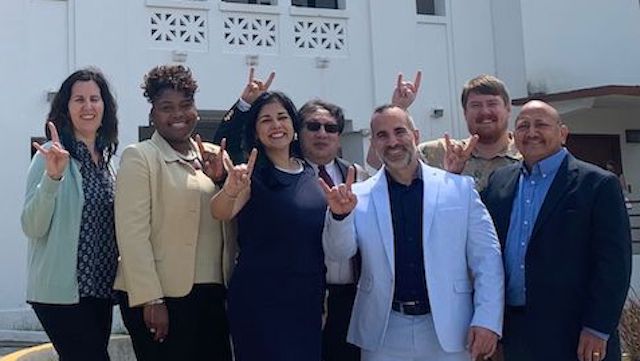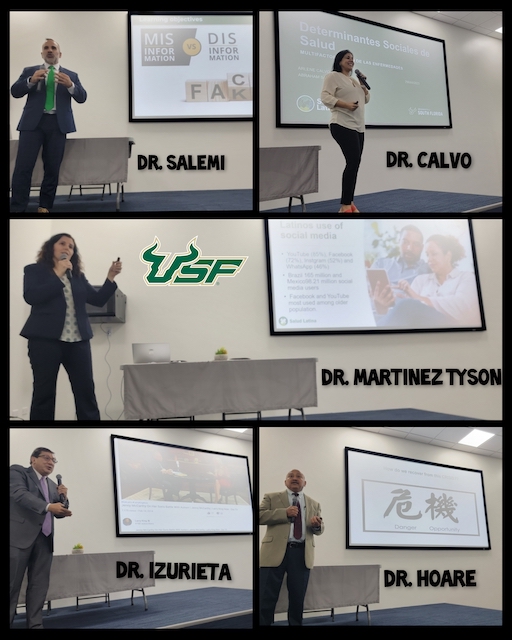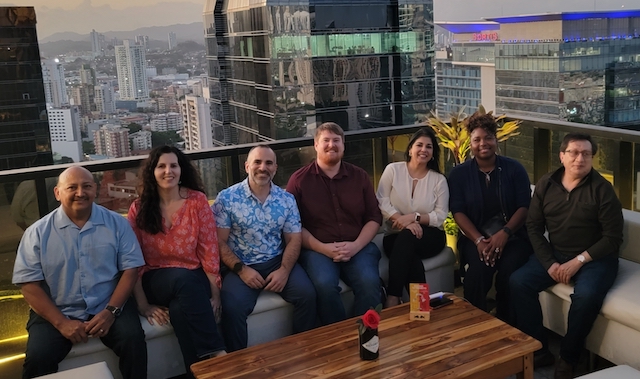Salud Latina addresses social determinants of health, misinformation in Latin America
In March, a team of USF faculty, including USF College of Public Health (COPH) Salud Latina faculty members Drs. Ismael Hoare, Ricardo Izurieta, Dinorah Martinez Tyson and Jason Salemi, traveled to Panama to attend and speak at an international forum focused on health disparities and misinformation in Latin America.
Also in attendance were Drs. Sylvia Thomas, interim vice president for research and innovation and president and CEO of the USF Research Foundation, and Ryan McMinds, a research assistant professor with the COPH’s Center for Global Health and Infectious Diseases Research (GHIDR).

They were joined in Panama by the forum’s organizer, Dr. Arlene Calvo, a USF COPH alumna and Panama native who is an associate professor at the college and director of the COPH’s Panama Program and the Salud Latina initiative.
The Panama Program offers international field experiences and internships, service learning, faculty and student exchange and multiple types of research and academic opportunities. Salud Latina works to address public health issues in Spanish heritage/Latin American communities around the globe.
The forum was a collaboration between the COPH, the University of Panama’s College of Medicine and School of Public Health, the Ciencia en Panama Foundation and the City of Knowledge, a research and academic campus that partners with the COPH’s Panama Program.
The registrants, roughly 100 in all, learned about a variety of issues, including those related to social determinants of health and misinformation as well as vaccine hesitancy.

“When I joined Salud Latina in 2021, one of our primary charges was to understand the disproportionate COVID-19 pandemic toll borne by communities throughout Latin America,” explained Salemi, a COPH associate professor, COPH alumnus and Salud Latina member who spoke at the forum. “Following the amazing contributions of my colleagues and students throughout the COPH over the past two years, we began to realize the potential collaborative impact we could have [in the region] on research, community engagement, academic scholarly exchange and support/mentorship of students.”
The group brainstormed on collaborative agreements for research, student and faculty exchange and potential grants among new and existing partners, including Panama’s National Secretariat of Science, Technology and Innovation, the Social Security Research Institute, the Gorgas Memorial Institute and the International Center for Political and Social Studies. In May, some of the Panamanian officials who took part in the partnership forging discussions will travel to the college to solidify project plans.

“We are planning agreements to further our collaborations with eight different agencies here in Panama,” Calvo said. “The City of Knowledge is the perfect hub for these programs because of its centralized location. It allows these programs to have a regional presence for research and exchange in all of Latin America. This year, the COPH celebrates its twentieth-year presence at the City of Knowledge from where we conduct research and academic activities in Panama and other Latin American countries.”
According to Salemi, the forum gave the COPH an opportunity to highlight its dedication and commitment to public health initiatives and improving the lives of those in Latin America and beyond.
“I think attendees got out of the forum exactly what so many get when they interact with any faculty, students or staff from the COPH,” Salemi said. “They know we love what we do. They know we are passionate about exacting real, meaningful change. They know we are committed to the communities we serve. And they know we are tireless in our pursuit of things that matter. From that end, we absolutely accomplished much of what we set out to do. And more.”
Story by Donna Campisano, USF College of Public Health
